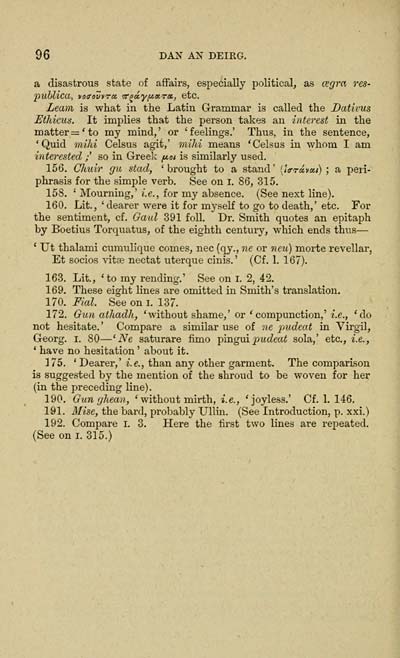Download files
Complete book:
Individual page:
Thumbnail gallery: Grid view | List view

96 DAX AX DEIRG.
a disastrous state of aflPairs, especially political, as cp(jm res-
publica, voaoZvTo, '^r^oi'yfji.xrx, etc.
Leam is what in the Latiu Grammar is called the Datincs
Ethicus. It implies that the person takes an intercst in the
matter='to my mind,' or 'feelings.' Thus, in the sentence,
'Quid mihi Celsus agit,' mìhi means 'Celsus in whom I am
interestecl ; so in Greek ^o/ is similarly used.
156. Chuir (ju stacl, ' brought to a stand' ['Krroiveii) ; a peri-
phrasis for the simple verb. See on l. 86, 315.
158. ' Mourning,' i.e., for my absence. (See next line).
160. Lit., ' dearer were it for myself to go to death,' etc. For
the sentiment, cf. Gaul 391 foll. Dr. Smith quotes an epitaph
by Boetius Torquatus, of the eighth century, which ends thi;s —
' Ut thalami cumulique comes, nec (qy., ne or neu) morte revellar,
Et socios vitte nectat uterque cinis.' (Cf. 1. 167).
163. Lit., 'to my rending.' See on I. 2, 42.
169. These eight lines are omitted in Smith's translation.
170. Fial. See on l. 137.
172. Gun athadh, 'without shame,' or ' compunction,' i.e., 'do
not hesitate.' Compare a similar use of ne pudeat 'va. Virgil,
Georg. I. 80 — ' Ne saturare fimo pingui^JwcZea^ sola,' etc, i.e.,
' have no hesitation ' about it.
!175. ' Dearer,' i.e., than any other garment. The comparison
is suggested by the mention of the shroud to be woven for her
(in the preceding line).
190. Gun fjhean, ' without mirth, i.e., 'joyless.' Cf. 1. 146.
191. Mise, the bard, probably UlÌin. (See Introduction, p. xxi.)
192. Compare i. 3. Here the lìrst two lines are rejieated.
(See on i. 315.)
a disastrous state of aflPairs, especially political, as cp(jm res-
publica, voaoZvTo, '^r^oi'yfji.xrx, etc.
Leam is what in the Latiu Grammar is called the Datincs
Ethicus. It implies that the person takes an intercst in the
matter='to my mind,' or 'feelings.' Thus, in the sentence,
'Quid mihi Celsus agit,' mìhi means 'Celsus in whom I am
interestecl ; so in Greek ^o/ is similarly used.
156. Chuir (ju stacl, ' brought to a stand' ['Krroiveii) ; a peri-
phrasis for the simple verb. See on l. 86, 315.
158. ' Mourning,' i.e., for my absence. (See next line).
160. Lit., ' dearer were it for myself to go to death,' etc. For
the sentiment, cf. Gaul 391 foll. Dr. Smith quotes an epitaph
by Boetius Torquatus, of the eighth century, which ends thi;s —
' Ut thalami cumulique comes, nec (qy., ne or neu) morte revellar,
Et socios vitte nectat uterque cinis.' (Cf. 1. 167).
163. Lit., 'to my rending.' See on I. 2, 42.
169. These eight lines are omitted in Smith's translation.
170. Fial. See on l. 137.
172. Gun athadh, 'without shame,' or ' compunction,' i.e., 'do
not hesitate.' Compare a similar use of ne pudeat 'va. Virgil,
Georg. I. 80 — ' Ne saturare fimo pingui^JwcZea^ sola,' etc, i.e.,
' have no hesitation ' about it.
!175. ' Dearer,' i.e., than any other garment. The comparison
is suggested by the mention of the shroud to be woven for her
(in the preceding line).
190. Gun fjhean, ' without mirth, i.e., 'joyless.' Cf. 1. 146.
191. Mise, the bard, probably UlÌin. (See Introduction, p. xxi.)
192. Compare i. 3. Here the lìrst two lines are rejieated.
(See on i. 315.)
Set display mode to: Large image | Transcription
Images and transcriptions on this page, including medium image downloads, may be used under the Creative Commons Attribution 4.0 International Licence unless otherwise stated. ![]()
| Early Gaelic Book Collections > J. F. Campbell Collection > Dàn an Deirg agus Tiomna Ghuill (Dargo and Gaul) > (132) |
|---|
| Permanent URL | https://digital.nls.uk/77289110 |
|---|
| Description | Volumes from a collection of 610 books rich in Highland folklore, Ossianic literature and other Celtic subjects. Many of the books annotated by John Francis Campbell of Islay, who assembled the collection. |
|---|
| Description | Selected items from five 'Special and Named Printed Collections'. Includes books in Gaelic and other Celtic languages, works about the Gaels, their languages, literature, culture and history. |
|---|

